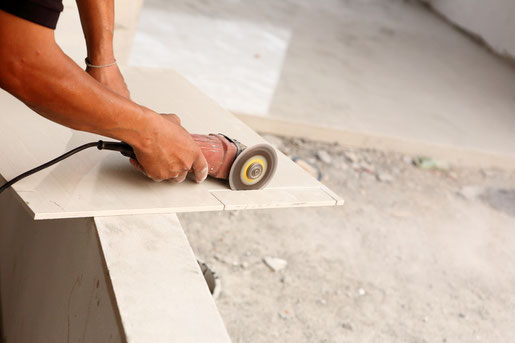Ceramic Tile

Tile flooring is manufactured from a variety of materials such as stone, clay, terrazzo, metal and quartz. Every tile flooring has its own defining characteristics. The two most common tile flooring is ceramic and natural stone.
Ceramic tile is manufactured from clay materials that are quarried, prepared, and then formed into a mold. The forming methods for ceramic tile include dry press, extruded, and slush mold. The dry press forming method is as it sound and involves a mixture of dry material being pressed into the mold under extreme pressure. Extruded ceramic tile is formed when a mixture of slightly moist material is extruded into a mold. Slush mold is a forming method in which the mixture is very wet, the material is poured into a mold and then hardened in at an extremely high temperature in a kiln at an extremely high temperature.
Ceramic tile is either porcelain or non-porcelain. Traditional ceramic tile is non-porcelain and is made from clay that is either white, red, and/or brown along with other minerals. Porcelain tile is also made from clay and minerals as well, but it contains approximately 45% of feldspar a white dust or sand. Feldspar is a crystal like substance found in rock that when heated acts as a "flux". In the making of ceramic tile this is during the kiln-drying process. The Feldspar actually melts into a glass-like material and bonds all of the molded ingredients together. Like all craft there are always some modification to the process or ingredients of ceramic tile. The type of kiln and the temperature can create a vast variety in the characteristics and appearance of manufactured ceramic tile flooring products.
Porcelain and non-porcelain ceramic tile can be un-glazed or glazed. Glazed ceramic tile has a finish similar to paint in that it can be matte, semi-gloss, or high-gloss. These can be applied to the surface during the manufacturing process. Glazed tile was kiln-fired twice in the past, once to harden the mold and a second time to harden the applied glaze. Today both processes can be performed in one step called Monocuttura. Glazed ceramic tile has increased stain resistance, scratch resistance, and provides for better traction, as well as decreased water absorption, in comparison to tile that is un-glazed.
Non-porcelain, ceramic tile is very economical compared to most all other types of flooring. Porcelain ceramic flooring is typically more expensive than non-porcelain and for the installer can be harder to work with. The benefit is that it offers a longer lasting floor with greater durability, natural stain resistance, minimal water absorption, and longer lasting color. Today, there are many types of tile flooring that are manufactured in a similar way to ceramic tile, but as a group they are far less common and usually regional. These include brick, cement, glass, saltillo, en caustic and the most popular of the non ceramic tiles Terra cot ta tile. The variety of materials and the differing manufacturing processes help make each product have distinctive characteristics and add to their own style.
